

February 2024 Edition!
AIU News + Essays + Education + Culture + Science + Technology + Art + Design + Body + Mind + Environment + Human Rights + + Blockchain Technology & Digital Currency + About AIU


AIU News + Essays + Education + Culture + Science + Technology + Art + Design + Body + Mind + Environment + Human Rights + + Blockchain Technology & Digital Currency + About AIU
 JANUARY
15, 2024. We
would like to
congratulate
our student for
his most recent
achievement.
Ramesh Prasad Bhatt
Bhatt is enrolled at AIU in the
Post-Doctorate of Environmental
Science program. His
research article titled Environmental
Impact Assessment
System and Process in Developing
Countries has been successfully
published with Research Publishing
– An Academic Publisher
(https://www.scirp.org/journal/paperinformation.
aspx?paperid=130323). Abstract: Environmental
impact assessment (EIA), a decision-
making process for project
appraisal and sustainability
adopted globally as an administrative
process to identify,
predict, evaluate, and monitor
projects from their feasibility,
preconstruction, construction,
and operation stages to mitigate
the adverse impacts and
enhance the beneficial impacts
for the protection of the affected
environment. The study
objective is to explore global EIA
systems and processes and find
shortcomings and implications
for making the best instrument
or tool to protect the natural
environment from man-made
activities over the project cycle.
Ramesh Prasad Bhatt Bhatt
had his opportunity to share
his accomplishment with us at
AIU, which has provided him
with the necessary knowledge
and support to undertake such
research endeavors. We wish
him all the best in all his future
projects.
JANUARY
15, 2024. We
would like to
congratulate
our student for
his most recent
achievement.
Ramesh Prasad Bhatt
Bhatt is enrolled at AIU in the
Post-Doctorate of Environmental
Science program. His
research article titled Environmental
Impact Assessment
System and Process in Developing
Countries has been successfully
published with Research Publishing
– An Academic Publisher
(https://www.scirp.org/journal/paperinformation.
aspx?paperid=130323). Abstract: Environmental
impact assessment (EIA), a decision-
making process for project
appraisal and sustainability
adopted globally as an administrative
process to identify,
predict, evaluate, and monitor
projects from their feasibility,
preconstruction, construction,
and operation stages to mitigate
the adverse impacts and
enhance the beneficial impacts
for the protection of the affected
environment. The study
objective is to explore global EIA
systems and processes and find
shortcomings and implications
for making the best instrument
or tool to protect the natural
environment from man-made
activities over the project cycle.
Ramesh Prasad Bhatt Bhatt
had his opportunity to share
his accomplishment with us at
AIU, which has provided him
with the necessary knowledge
and support to undertake such
research endeavors. We wish
him all the best in all his future
projects.
 AUGUST 24,
2023. One of
our students,
Fredy
Leonel Archila
Morales, was
awarded the
Order of the Quetzal, in the
highest rank of “Gran Caballero”
(Grand Knight), for his
projection in environmental
research and conservation.
The Order of the Quetzal is
the highest honorary distinction
granted by the government
of Guatemala. It was established in 1936, with the
degrees: Collar, Gran Cruz,
Gran Oficial, Comandante Oficial
and Gran Caballero.
Fredy Archila, a dedicated
botanist, has received around
350 awards (in Guatemala and
abroad) mainly for his work
with the ‘Monja Blanca’ orchid,
“the jewel of the forest”, and
national symbol of Guatemala
since 1934. After having been
considered extinct, since 2017
the orchid grows again in the
forests of Guatemala thanks to
in-vitro cultivation achieved by Fredy and a group of colleagues
at the Orchid Experimental
Station.
Fredy Leonel Archila
Morales studies a Doctorate
program in Enviromental Sciences
at Atlantic International
University.
AUGUST 24,
2023. One of
our students,
Fredy
Leonel Archila
Morales, was
awarded the
Order of the Quetzal, in the
highest rank of “Gran Caballero”
(Grand Knight), for his
projection in environmental
research and conservation.
The Order of the Quetzal is
the highest honorary distinction
granted by the government
of Guatemala. It was established in 1936, with the
degrees: Collar, Gran Cruz,
Gran Oficial, Comandante Oficial
and Gran Caballero.
Fredy Archila, a dedicated
botanist, has received around
350 awards (in Guatemala and
abroad) mainly for his work
with the ‘Monja Blanca’ orchid,
“the jewel of the forest”, and
national symbol of Guatemala
since 1934. After having been
considered extinct, since 2017
the orchid grows again in the
forests of Guatemala thanks to
in-vitro cultivation achieved by Fredy and a group of colleagues
at the Orchid Experimental
Station.
Fredy Leonel Archila
Morales studies a Doctorate
program in Enviromental Sciences
at Atlantic International
University.
 Call for Papers
This Conference will be held
June 13–14, 2024 at University
of Granada, Granada, Spain.
Founded in 2010, the Sport
& Society Research Network
is brought together around a
common interest in cultural,
political, and economic relationships
of sport to society.
We invite proposals for paper
presentations, workshops/
interactive sessions, posters/
exhibits, colloquia, focused
discussions, innovation showcases,
virtual posters, or virtual
lightning talks.
Call for Papers
This Conference will be held
June 13–14, 2024 at University
of Granada, Granada, Spain.
Founded in 2010, the Sport
& Society Research Network
is brought together around a
common interest in cultural,
political, and economic relationships
of sport to society.
We invite proposals for paper
presentations, workshops/
interactive sessions, posters/
exhibits, colloquia, focused
discussions, innovation showcases,
virtual posters, or virtual
lightning talks.
 JANUARY,
2024. One of
our graduates,
Cheikh
Mohamadou
Bachir, has
had several
recent
achievements.
In July
2023, he was invited to the
University of Karamen, Türkiye,
for partnership and research of
project funding. There, he received
a gift of distinction from
the Rector of the University,
and since then he has been
hired as a research teacher in
Entrpreneuriat, in Business Plan Writing,
and in
Business
Creation
and
Management,
with
the option
of online
modality.
He has also been invited to
two Turkish public universities,
one in Bolu and the other
in Gumushane.
In Senegal, he has been
working since 2022 as an
instructor researcher in the
Department of Agri-food and
International Trade at the University of Thies (IUT, Institut
Universitaire de Technologie),
where he is also a Professor
researcher in the department
GEA Management of Companies
and Administrations.
Finally, since September 2022
he has been studying an MBA
at Paris Dauphine University,
France, and a Master 2 in Management
at IAE Sorbonne 1.
Cheikh Mohamadou Bachir
completed a Doctorate program
in Business Administration
at Atlantic International
University.
JANUARY,
2024. One of
our graduates,
Cheikh
Mohamadou
Bachir, has
had several
recent
achievements.
In July
2023, he was invited to the
University of Karamen, Türkiye,
for partnership and research of
project funding. There, he received
a gift of distinction from
the Rector of the University,
and since then he has been
hired as a research teacher in
Entrpreneuriat, in Business Plan Writing,
and in
Business
Creation
and
Management,
with
the option
of online
modality.
He has also been invited to
two Turkish public universities,
one in Bolu and the other
in Gumushane.
In Senegal, he has been
working since 2022 as an
instructor researcher in the
Department of Agri-food and
International Trade at the University of Thies (IUT, Institut
Universitaire de Technologie),
where he is also a Professor
researcher in the department
GEA Management of Companies
and Administrations.
Finally, since September 2022
he has been studying an MBA
at Paris Dauphine University,
France, and a Master 2 in Management
at IAE Sorbonne 1.
Cheikh Mohamadou Bachir
completed a Doctorate program
in Business Administration
at Atlantic International
University.
 JANUARY, 2024.
These graduate students
completed their program
with a high cumulative grade
point average, which reflects
the quality of performance
within their respective major.
Congratulations!
JANUARY, 2024.
These graduate students
completed their program
with a high cumulative grade
point average, which reflects
the quality of performance
within their respective major.
Congratulations! Call for Papers
This Conference will be held
January 23–25, 2025
at Florida International
University, Miami, USA.
We invite proposals for paper
presentations, workshops/
interactive sessions, posters/
exhibits, colloquia, focused
discussions, innovation showcases,
virtual posters, or virtual
lightning talks.
Call for Papers
This Conference will be held
January 23–25, 2025
at Florida International
University, Miami, USA.
We invite proposals for paper
presentations, workshops/
interactive sessions, posters/
exhibits, colloquia, focused
discussions, innovation showcases,
virtual posters, or virtual
lightning talks.
| Ivany Neto Carlos Doctor of Business and Economics Accounting Angola |
Adriani Annelise Coleman Doctor of Education Artificial Intelligence in Educational Tech. Belize |
Rajeev N.W Goonewardene Doctor of Philosop hy Physics Education Bermuda |
Christine Muthue Mualuko Master of Science Guidance Counseling Cambo dia |
Eyong Sylvester Defang Master of Science Information Systems Cameroo n |
Bandora Canisius Master of Business Administration Business Administration Canada |
| Miguel Angel Mercado Campusano Doctor of Project Management Project Management Chile |
Carlos Manuel Carcache Rivas Doctor of Philosop hy Architecture El Salvador |
Milagrosa Epam Ona Bachelor of Science Accounting Equatorial Guinea |
Jean Stanislas Tolassy Doctor of Counseling Counseling France |
Olawole Adeniyi Adetayo Doctor of Philosop hy Information Technology Ghana |
Francis K. Adu-Boahen Associate of Business Administration Marketing Ghana |
| Awini Ali Baba Doctor of Philosop hy Public Health and Epidemiology Ghana |
Gabriela Virginia Albizures Yaquian Bachelor of Science Industrial Engineering Guatemala |
Ramnaraine Ragoobar Doctor of Philosop hy Educational Leadership Guyana |
Edouard Francois Latortue Doctor of Science International Business Haiti |
Kesnel Narcisse Bachelor of Science Agriculture Haiti |
Reginea Sharlotte Shirley Doctor of Philosop hy Community Development Jamaica |
| Caroline Makena Riungu Doctor of Philosop hy Social Policy Kenya |
Kenneth Kamau Kabage Master of Business Business Management Malawi |
Lizet Chemor Sánchez Doctor of Business Administration Business Administration Mexico |
Tércio Vasco Masseque Master of Science Safety and Crisis Management Mozambique |
Juan José Montoya Pérez Post-Doctor of Finance Finance Nicaragua |
Obara Chibueze Ndubuisi Doctor of Philosop hy Human Resources Management Nigeria |
| Nana M. Kote Master of Science Engineering Systems Nigeria |
Yanssy Aymeé Gallardo Castillo Bachelor of International Business International Business Panama |
Arianne Mae S. Arevalo Doctor of Science Physical Education Philipp ines |
Rose-Marie Bargain Doctor of Philosop hy Blue Economy Seychelles |
Alusine Conteh Bachelor of Science Information Technology Sierra Leone |
Ringo Star Masakwa Doctor of Philosop hy Strat. Planning, Monitoring and Evaluation South Africa |
| Elijah Khot Ajok Kuer Bachelor of Science Public Health South Sudan |
Musa Alex Yairo Genyi Bachelor of Science Information Technology and Management South Sudan |
Anisha Anika Patterson Doctor of Philosop hy Sociology Trinidad and Toba go |
Anabel Ventura Lantigua de Campaña Bachelor of Education Education US A |
Domingo Antonio Rodríguez Doctor of Education Teaching Philosophy US A |
Glenda Reoyo Pazos Doctor of Arts Art and Culture US A |
| Arturo Fuentes Bachelor of Science Biochemical Engineering US A |
Josh McKenna Thomas Doctor of Philosop hy Cloud Computing US A |


We are living in a very
special world: a war here,
another war there, cultures in
total opposition, human beings
for whom there are no rights
that allow them to live, beings
who are richer every day,
climatic changes with strong
earthquakes, strong floods,
artificial intelligence, and little
understanding between the
beings who are said to possess
intelligence. We would also
have to add hate speech and
disinformation on a large scale.
Where is the salvation for
this 2024?
There is a path that must be
salvation; the education.
Why do we say education?
We are witnesses of the space
where all the resources for life
come from: our planet Earth
and the ability that human
beings must convert those resources
into goods for our lives.
Skills come to us: some we
develop over the years of life
and others we learn. Those
learned are obtained through
teaching in schools. The skills
learned every day become more
necessary because the place where they are applied is to
create better ways to develop
the products we need.
The previous reason is the
reason why we must learn
every day, or we will be left
out of the industry of producing
goods and services without
work not because they don’t
love us because there is not
space for people who don’t
want to learn. It means that
you must study, as the United
Nations Educational, Scientific
and Cultural Organization,
UNESCO, says, for life.
UNESCO has an Institute
dedicated to Lifelong Learning.
https://www.uil.unesco.org/es
Where to study? These
skills are achieved by accrediting
all levels of Education,
starting with basic studies, and
ending at universities.
It is well known: The
Sustainable Development
Goals proposed by the United
Nations - UN. They include
Objective 4, which refers to
education. https://www.un.org/
sustainabledevelopment/es/
What happens with education
that we have all the
problems mentioned that it
seems that the purpose of
Humanity is to disappear with and the planet
Earth? Among the problems
that we have as societies is
that education hasn’t
been what it should be to
generate a decent life for
every living being and
the planet.
The UN makes an annual
report on The Sustainable Development
Goals —SDGs. Let’s see
what the Report says for the
year that just ended: 2023.
“Halfway to the deadline
for the 2030 Agenda, the SDG
Progress Report, Special Edition,
shows that more than
half the world is being left
behind. Progress on more than
50% of SDG targets is weak and
insufficient, and 30% are stagnant
or have regressed. These
include essential goals on
poverty, hunger, and climate.
If we do not act now, Agenda
2030 could become an epitaph
for the world that could have
been.” Sustainable Development
Goals Report 2023: Special Edition.
For a rescue plan for people and
the planet. Foreword. UN- 2023.
https://unstats.un.org/sdgs/report/2023/
The-Sustainable-Development-Goals-
Report-2023_Spanish.pdf
The UN clearly expresses
what we are experiencing at
this moment as a society: the
events we are experiencing are
clear. The question we must
ask ourselves is: Why, living
what we live, do we not take
the right path for our own existence?
We reach such levels of
misinformation that we do not
believe in the science we do,
which, through tried and tested
methods, has precisely led us
to artificial intelligence: now
everything is a lie and a lie.
We are at incredible levels
of misinformation. Getting to
where we are and now denying
everything is the madness of a
civilization.
The only objective of the
media used to spread lies, the
digital platforms, is to obtain
money and money.
Faced with so much problem
generated, developed countries
are implementing laws to
contain the disaster.
On the contrary, less developed
countries are seeing the
opportunity to create images
of politicians to generate
populist governments or
coups d’état, which flourish like
mushrooms.
Therefore, the UN says: “The
SDGs are the universally agreed
roadmap to overcome economic
and geopolitical divisions, restore trust and rebuild solidarity.
Lack of progress means
inequalities will continue
to deepen and the risk of a
fragmented two-speed world
will increase. “No country can
afford the failure of the 2030
Agenda.” Sustainable Development
Goals Report 2023: Special Edition.
For a rescue plan for people and the
planet. Foreword . UN - 2023. https://
unstats.un.org/sdgs/report/2023/
The-Sustainable-Development-Goals-
Report-2023_Spanish.pdf
The UN making efforts so
that this world we live in becomes
aware of the path we are
taking. “We have entered an
era of polycrisis. Conflict, climate
change, the lingering effects
of the COVID-19 pandemic
and other global challenges
threaten to derail hard-won
progress toward meeting the
SDGs.” Sustainable Development Goals
Report 2023: Special Edition. For a
rescue plan for people and the planet.
Introduction. UN - 2023. https://
unstats.un.org/sdgs/report/2023/
The-Sustainable-Development-Goals-
Report-2023_Spanish.pdf
We are experiencing war
conflicts that are becoming
deeper every day. It seems incredible
that understanding is
not possible with the power of
reason, now the weapons.
“The world is falling behind
in achieving quality education
Completion rate 84 million
children and youth will
not attend school 300 million students will not achieve basic
literacy and numeracy skills
only 1 in 6 countries will reach
the completion goal of universal
secondary education. Sustainable
Development Goals Report 2023: Special
Edition. For a rescue plan for people and
the planet. UN - 2023. p. 81. https://
unstats.un.org/sdgs/report/2023/
The-Sustainable-Development-Goals-
Report-2023_Spanish.pdf
If this is the future of secondary
studies, from there we
can infer what will become of
studies at the university level;
also, what will become of
coexistence.
“Make digital transformation
respond to everyone’s
needs. The digital divides that
continue to exist between
and within countries prevent
widespread progress on the
Goals and make it difficult to
use new data sources. These
gaps should be addressed
holistically, taking not just
a whole-of-government approach,
but a pan-systemic
approach focusing on infrastructure,
digital skills and
inclusive environments, with
the support of the global
development community”.
Sustainable Development Goals Report
2023: Special Edition. For a rescue
plan for people and the planet. UN-
2023. p. 51. https://unstats.un.org/
sdgs/report/2023/The-Sustainable-
Development-Goals-Report-2023_
Spanish.pdf
We have a very clear analysis of what we are doing as human
beings. It seems we are betting
on how soon we reach the end
of this civilization.
An insurance situation
became clear: we study, or we
study. We take care of life, for
everyone: Planet and human
beings or we will disappear.
You are studying at Atlantic
International University: Study, study. Every day
you should have more
interest because your
personal growth depends
on it in all aspects.
Being happy is being
able to decide: what I
want, when and how.
On you, nothing more
than on you, it depends
what you want to be.
BIBLIOGRAPHY. UNESCO - Instituto para el aprendizaje a lo largo de
Toda la Vida. https://www.uil.unesco.org/es | ONU - Objetivos de Desarrollo
sostenible reporte 2023. https://unstats.un.org/sdgs/report/2023/The-
Sustainable-Development-Goals-Report-2023_Spanish.pdf | ONU - Objetivos
de Desarrollo Sustentable. https://www.un.org/sustainabledevelopment/
es/ | ONU - The Sustainable Development Goals Report 2023.
https://unstats.un.org/sdgs/report/2023/The-Sustainable-Development-Goals-
Report-2023.pdf

4.0 Altruism
Altruism is defined as the
selfless and disinterest that
is displayed relating to the
concern and well-being and of
others. Altruists assist others
in society to cooperate with
each other and work towards a
common goal. This togetherness
benefits others without
expecting something in return. (Bhuvana, Pavithra, &Suresha,).
This shows that altruism can
lead to helpful actions. Altruism
plays an essential role in
society as it fosters cooperation.
Altruism supports cooperation
and reduces negligence
in society. Altruistic actions,
when sustained over time may
result in dependence and may
inhibit self-improvement. Altruistic feelings are often directed
at one’s group. The act
of altruism has been positively
linked to cooperation in the
workplace and has contributed
to better economic outcomes.
Altruism reduces dependence
on a team and fosters collaborative
efforts.
Altruism is also expressed
within the families which are vehicles for social stability.
Parents have a responsibility
to take care of their children
which is expressed in altruism.
Children rely on the gift
of money and time to gain
financial and human capital.
Altruism contributes to intergenerational
mobility.
According to Devereux
(2019), the more altruistic
parents are, the more they invest
in their children’s human
capital accumulation. Altruistic
acts also benefit the givers.
Post (2005) documented that
altruistic behaviours and emotions
contribute to the positive
well-being of individuals and
enhance their longevity and
health. (Beach, Roter, Korthuis, Epstein, Sharp and Ratanawongsa
(2016). Even though there are
benefits to altruism there are
also some limitations. The
altruistic sentiments and acts
can generate negative externalities
for others and the
broader society.
4.2 Prejudice and
self-deception
Self-deception is lying to
oneself even despite the facts
presented. Some individuals
choose to ignore the facts
which may result in unpleasant
surprises. Some circumstances
are disappointing and maybe
shocking and this may result
in some individuals being unable to face it. Psychology
posits that we are unable
to ‘acknowledge things that
are too painful and this may
lead to denial. The presence of
irrational thoughts can occur
without being motivated, and
humans may try to justify their
actions. (Chance, Norton, Gino, and
Ariely, 2011).
The self-deceiver is cognizant
of the evidence that is
present but still manages to
resist its existence. For example,
an insensitive employer
may be of the view that he is
respected by his employees, a
mediocre young artist may be
of the view that his work is too
understated to be acknowledged
and appreciated by the
wider art market, an abused
wife may believe her husband
won’t hurt her again and the
first time was not intentional
and lastly the mother of a killer
or a suspect may think ‘there
is a mistake with identity.’
These are all clear examples of
self-deception.
There are individuals in
society who display some
level of bias towards others in
society and this may be related
to their race, gender, or rank in
society. In some societies, one
race can be beneficial while
in others it may present some
limitations. Some individuals
are ranked in society and
this may result in some form
of prejudice being established.
According to Misra, Goldmann,
and Yang (2020) all human beings
belong to a single species
and that there is no scientific
basis for a hierarchical ranking
of human races.
Many may argue that the
characteristics of an individual
tell who he or she is. However,
Sigmund Freud’s psychoanalytic
theory of personality,
indicates that the three
elements of personality known
as the id, the ego, and the superego
work together to create
complex human behaviours.
Prejudiced attitudes can have
negative health and social
consequences. This is because
the actions impair social
interactions and undermine
the positive contributions of
groups to societies. Prejudice
is associated with stereotypes
as well as discrimination. This
harms society in general.
5.0 Theory
To have a better understanding
of one’s personality
and what contributes to the
function of an individual some
specific theories and principles
aid in better understanding.
Erik Erikson’s developmental
theory is instrumental in
having a better understanding
of self. The theory comprises
eight stages of psychosocial
development ranging from
infancy to adulthood. (Baily
and Daley, 2023). During each
stage, the person experiences
a psychosocial crisis which
can have a positive or negative
outcome on personality development.
The theory posits that
when each stage is successfully
completed it contribute to the
establishment of a healthy personality.
When an individual
fail to complete a stage it may
result in unhealthy personality
and it may result in compromise
of self.
In respect to identity and the
formation of one’s personality
Erikson’s fifth stage of development
which is “Identity vs.
Role confusion, will be focused
on. This stage focuses on
individuals from about twelve
to eighteen years. It is during
this stage that young teenagers
search for a sense of self and
personal identity. This can be
established through exploration
of beliefs, set goals and
personal values. During this
stage decisions may also be
taken on the premises of the
view of other peers. For instance,
adolescents may choose
to engage in unaccepted social
behaviour such as smoking as
they want to fit in and keep up
with their appearance. Baily and
Daley, 2023
During this stage, the individual
wants to belong to a
society and fit in. It is during
this stage that adolescence
re-examine their identity and
try to find out exactly who they
are. According to Erickson as
individuals’ transition from
childhood to adulthood, adolescents
ponder the roles they
will play in the adult world.
This may also contribute to
them experimenting with a
variety of behaviours and activities
(Cherry, 2020).
Varied behaviour is displayed
by individuals based on the
environment with which they
are associated. The study of
human behaviour produces
helpful cultural and societal insights. The situation varies
among individuals as there can
be various causes of behaviours
such as the genetic background
of the individual, their personality
change, and also the
environment with which they
are associated. The behaviour
that individuals display is a
result of their interaction with
their environment.
Different approaches can be
used to understand the behaviour
an individual displays
based on the characteristics
observed. Other theories can
be used to explain behaviour.
The Theory of Self-efficacy
was developed by Bandura
and other colleagues and was
used to predict and explain
individual health behaviour
and this catered to better
understanding of self and
personality. (Williams & Rhodes,
2016). The Freudian approach
allows individuals to recognize
that behaviour is not always
consciously explained. “Unconscious”
is the major factor
which guides the individual’s
behaviour.
In this model, the behaviour
is dependent on two factors
which are the stimulus and
response. Other proponents of
the theory such as Pavlov and
Watson indicate that learning
occurs with this kind of model.
They also indicated that behaviour
can be best understood
by stimulus and response.
5. 1 Contribution
of paper
The concept of self and
identity has contributed to an
individual knowing about the
role that they play in society
as well as how their actions
and behaviour impacts society.
Within society, individuals
have to relate to and abide by
social norms. The response of
an individual promotes connections
and allows individuals
to have a sense of belonging
within groups. Understanding
who we are helps to shape our
identity and this contributes to
one’s functionality in society.
The personality that is created
can contribute to the outside
social and cultural world and
how we understand ourselves
as a person.
In analysing the view of
various contributors who
focus on the concept of self
it is shown that both self and
identity relate to the inner
phenomenal experience
and how one functions in
the outer world. This paper
also caters to a better understanding
of the difference
between self and personality.
It was understood through the
exploration of concepts that
personality is a thing while
self is a perspective. Personality
can be characterized as
those internal psychological
structures and mechanisms
that influence the way in which an individual interacts
with the world and also
adapts to changes in society.
To function in society there
is a need to abide by societal
rules. Rules are regulations
that the people under a government
or institution that is
stipulated to be followed. Rules
are important as families and
citizens have to live their lives
happily and safely. The review
of the paper has highlighted
that rules are important because
they help with the maintenance
of civil behaviour, and
contributes to more harmony
in society. Agreeably, rules
help to organise society even
though they varies from one
society to another. Additionally,
rules may be followed or
broken based on the perspective
that one has about self and
how society should be operating
in general.
In operating in an insane
society where everything
fluctuates having an understanding
of self is important
and this is coined from birth.
Various theories have helped
individuals and those in the
wider society to have an understanding
of how they behave
and why they behave in
a certain way. There are different
ways in which self and
identity influence how people
think, and behave to each
other because there can stem
some form of prejudice. Hence
in functioning in society, it is
important to have goals that
are perusable and to function
in society individuals must be
able to learn to cope and adapt
to new environments and
respond appropriately to new
situations.
5.2 Conclusion
Through the exploration of
this paper, it was found that an
individual’s personality is instrumental
in helping them to
function in society. (Public Policy Research (IPPR), 2020). The perception
that an individual has
about themselves can act as a
driving force and contribute
to effective functioning in the
home and the wider society.
An individual need to develop
self-awareness, self-concept,
self-esteem and a combination
of technical, human, and technical
skills to help deal with
challenges that may arise.
It has been highlighted
obedience and conformity help
in the identification of who an
individual is which is portrayed
through their character.
An individual’s personality
may be stable over some
time however, situations and
changes in perception can result
in changes in response to
situations. (Hennecke et al., 2014;
Wrzus& Roberts, 2017).
Even though individual’s
show moderately good selfinsight,
motivational factors
can limit their self-perceptions
and this may affect their
functionality in society. The
writer has come to acknowledge
that emotions provide the
fuel for the different personality
that is displayed in society.
Through the reinforcement
of adaptive social behaviours
individuals are encouraged to
respond to situations in ways
that promote their acceptance,
conformity and their
social status. This indicates
that self-conscious emotions
do contribute to individuals
adapting to change and tackling
social challenges
Conclusively, the development
of identity accounts for
an individual’s perceptions of
themselves and how they are
positioned by others in terms of
tradition, culture, race, rituals,
family, religion, and education.
The perception that an individual
has about themselves
can also affect their positions
in society. Thus, carefully
examining one’s identity can
help identify and acknowledge
the role that the individual
plays in society. THE END
REFERENCES. Atherton, O. E., Grijalva, E., Roberts, B. W., & Robins, R. W. (2021). Stability
and change in personality traits and major life goals from college to midlife. Personality
and Social Psychology Bulletin, 47(5), 841-858. https://doi.org/10.1177/0146167220949362 |
Adler, J. M., Lodi-Smith, J., Phillippe, F. L., & Houle, I. (2016). The incremental validity
of narrative identity in predicting well-being: A review of the field and recommendation
for the future. Personality and Social Psychology Review, 20(2), 142-175. https://
doi.org/10.1177/1088868315585068 | Bailey and Daley (2023). Understanding Psychosocial
Development. https://www.verywellhealth.com/psychosocial-development-5220563 | Beach
M. C., Roter D., Korthuis P. T., Epstein R. M., Sharp V., Ratanawongsa N., Cohn J., Eggly
S., Sankar A., Moore R. D., Saha S. 2013. A multicenter study of physician mindfulness
and health care quality. The Annals of Family Medicine, 11: 421-428. | Beer, J. S. (2016).
Three questions about the neural basis of self. In E. Harmon- Jones & M. Inzlicht (Eds.),
Social neuroscience: Biological approaches to social psychology (pp. 77-100). Routledge. |
Bhuvana, M. L., Pavithra, M. B., &Suresha, D. S. (2021). Altruism, an attitude of unselfish
concern for others - an analytical cross sectional study among the Medical and Engineering
students in Bangalore. Journal of family medicine and primary care, 10(2), 706–711.
https://doi.org/10.4103/jfmpc.jfmpc_834_20 | Chance, Z., Norton, M. I., Gino, F., and Ariely,
D. (2011). Temporal view of the costs and benefits of self-deception. Proc. Natl. Acad.
Sci. USA 108, 15655–15659. doi: 10.1073/pnas.1010658108 | Cherry K (2023). The 4 Major
Personality Perspectives. https://www.verywellmind.com/personality-perspectives-2795950 |
Cherry K (2020). Identity vs. Role Confusion in Psychosocial Development. https://www.
verywellmind.com/identity-versus-confusion-2795735 | Cherry K (2019) The Psychology of
Personality Development. https://www.verywellmind.com/personality-development-2795425 |
Cronin, T. J., Lawrence, K. A., Taylor, K., Norton, P. J., &Kazantzis, N. (2015). Integrating
Between session interventions (homework) in therapy: The importance of the therapeutic
relationship and cognitive case conceptualization. Journal of Clinical Psychology,
71, 439–450. http://dx.doi.org/10 .1002/jclp.22180 | Deranty, J P. (2016). Social Justice.
10.1002/9781118541555.wbiepc060. | Devereux, P. (2019) Intergenerational return to
human capital. IZA World of Labour 2019: 19 doi: 10.15185/izawol.19.v2 | Genschow, O.,
Klomfar, S., d’Haene, I., & Brass, M. (2018). Mimicking and anticipating others' actions is
linked to Social Information Processing. PloS one, 13(3), e0193743. https://doi.org/10.1371/
journal.pone.0193743 | Hennecke, Marie &Bleidorn, Wiebke&Denissen, Jaap. (2017). A
three-part Framework for self-regulated personality development across adulthood. European
Journal of Personality. European Journal of Personality. 10.1002/per.1945. | Hodgson,
Geoffrey M. (2019). Evolutionary Economics: Its Nature and Future. Cambridge University
Press. | Hodgson G (2019). Chapter 1: What does socialism mean? https://www.elgaronline.
com/view/9781789901610/06_chapter1.xhtml | Misra, S., Le, P.T., Goldmann, E. & Yang, L.H.
(2020). Psychological impact of anti-Asian stigma due to COVID-19 pandemic: A call for
research, practice, and policy responses. Psychological Trauma: Theory, research, practice,
and policy, 12(5), 461-464. doi:10.1037/tra0000821 | Tauber, A (2012). Freud’s social
theory. History of the Human Sciences. 25. 43-72.10.1177/0952695112460045. | Williams,
D. M., & Rhodes, R. E. (2016). The confounded self-efficacy Construct: conceptual analysis
and recommendations for future research. Health psychology review, 10(2), 113–128.
https://doi.org/10.1080/17437199.2014.941998
 A recent article in The Economist analyzing
Vietnam’s education system
has created quite a sensation among
Vietnamese readers. While the title
“Why are Vietnam’s schools so good?”
seems at first a sarcastic joke that many
people in Vietnam are no stranger to,
the content is anything but.
The article insists that Vietnam has
“one of the best schooling systems
in the world,” as proven by “stellar
performance” of its students, high
teaching quality by the teachers, and
supporting policy from the ruling Communist
Party. Thus, “Vietnam’s people
can have few complaints” regarding
the country’s education. In reality, it is
a very different situation. ...
A vast majority of graduated students
are considered unfit for the market and
have to be thoroughly retrained, a fact that has been continuously pointed out
since at least 20 years ago. ...
The quantity and quality of teachers
are other big issues. There have been
concerns about both the shortage and
low standard of the teaching staff. Not
only in the rural and remote areas,
even schools in big cities have been
struggling to find teachers. ...
Fraud is another chronic disease. In a
2012 survey, 84.6% of the students admitted
either committing or witnessing
cheating in exams. After the 2018 National
High School Examination, more
than 30 people, including police and
senior officers of the Department of
Education and Training in three provinces,
were prosecuted for taking bribes
and manipulating results ... Read full text:
Read full text:
A recent article in The Economist analyzing
Vietnam’s education system
has created quite a sensation among
Vietnamese readers. While the title
“Why are Vietnam’s schools so good?”
seems at first a sarcastic joke that many
people in Vietnam are no stranger to,
the content is anything but.
The article insists that Vietnam has
“one of the best schooling systems
in the world,” as proven by “stellar
performance” of its students, high
teaching quality by the teachers, and
supporting policy from the ruling Communist
Party. Thus, “Vietnam’s people
can have few complaints” regarding
the country’s education. In reality, it is
a very different situation. ...
A vast majority of graduated students
are considered unfit for the market and
have to be thoroughly retrained, a fact that has been continuously pointed out
since at least 20 years ago. ...
The quantity and quality of teachers
are other big issues. There have been
concerns about both the shortage and
low standard of the teaching staff. Not
only in the rural and remote areas,
even schools in big cities have been
struggling to find teachers. ...
Fraud is another chronic disease. In a
2012 survey, 84.6% of the students admitted
either committing or witnessing
cheating in exams. After the 2018 National
High School Examination, more
than 30 people, including police and
senior officers of the Department of
Education and Training in three provinces,
were prosecuted for taking bribes
and manipulating results ... Read full text:
Read full text:
 Birth rates were down again in France
in 2023. This was the main finding
from the annual demographic report
from the French National Institute for
Statistics and Economic Studies (INSEE),
presented in January. Despite this fall,
the population has grown at a rate of
0.3%, the same as in 2022. The second
most populous European country, behind
Germany, France had 68.4 million
inhabitants on January 1, 2024. ...
The drop in the birth rate, recorded
since 2011, always raises a sensitive
question: Is this the beginning of the
end for the French demographic model,
envied by our European neighbors for its
vitality? Or is the drop in births, 6.6%
lower in 2023 than in 2022, merely a
cyclical phenomenon?
Demographers say it’s hard to answer
at this stage. Admittedly, the total fertility rate (TFR), which stood at 1.68
children per woman in 2023, is down
again. However, with these latest results,
France remains one of the better
performers within the European Union,
where the average TFR was 1.5 children
per woman in 2020, the latest data
available, and is set to fall further.
Fertility is probably the most closely
scrutinized element in this annual
review. In a September publication, the
INSEE was already predicting “the lowest
number of births since the Second
World War” in 2022, but 2023 sets a
new record.
As a result, 678,000 babies were born
last year, 6.6% fewer than in 2022, and
almost 20% fewer than in 2010, when
the last peak in births was recorded.
Until now, "the drop in births was very
slight ...
Read full text:
Birth rates were down again in France
in 2023. This was the main finding
from the annual demographic report
from the French National Institute for
Statistics and Economic Studies (INSEE),
presented in January. Despite this fall,
the population has grown at a rate of
0.3%, the same as in 2022. The second
most populous European country, behind
Germany, France had 68.4 million
inhabitants on January 1, 2024. ...
The drop in the birth rate, recorded
since 2011, always raises a sensitive
question: Is this the beginning of the
end for the French demographic model,
envied by our European neighbors for its
vitality? Or is the drop in births, 6.6%
lower in 2023 than in 2022, merely a
cyclical phenomenon?
Demographers say it’s hard to answer
at this stage. Admittedly, the total fertility rate (TFR), which stood at 1.68
children per woman in 2023, is down
again. However, with these latest results,
France remains one of the better
performers within the European Union,
where the average TFR was 1.5 children
per woman in 2020, the latest data
available, and is set to fall further.
Fertility is probably the most closely
scrutinized element in this annual
review. In a September publication, the
INSEE was already predicting “the lowest
number of births since the Second
World War” in 2022, but 2023 sets a
new record.
As a result, 678,000 babies were born
last year, 6.6% fewer than in 2022, and
almost 20% fewer than in 2010, when
the last peak in births was recorded.
Until now, "the drop in births was very
slight ...
Read full text:
 Eighteen years following the return
of NASA’s Stardust mission to Earth,
which brought back the first samples
from a known comet, the true nature
of that icy object is coming into focus.
Stardust collected material from Wild
2, a comet that likely formed beyond
Neptune and currently orbits the sun
between Mars and Jupiter. Painstaking
analyses of the microscopic samples, recently
described in the journal Geochemistry,
have revealed a surprising truth
about the comet’s origins and history,
said Ryan Ogliore, an associate professor
of physics who has been studying the
Stardust samples for several years.
When Stardust launched in 1999,
many scientists expected the comet’s
rocky material would be dominated by
the primordial dust that built the solar
system. But the actual samples contained
a potpourri of dust that formed
from different events early in the solar
system’s history. ...
“Comet Wild 2 contains things we’ve
never seen in meteorites, like unusual
carbon-iron assemblages, and the precursors
to igneous spherules that make
up the most common type of meteorite,”
said Ogliore, who is a faculty
fellow of the McDonell Center for the
Space Sciences. “And all of these objects
have been exquisitely preserved within
Wild 2.
Eighteen years following the return
of NASA’s Stardust mission to Earth,
which brought back the first samples
from a known comet, the true nature
of that icy object is coming into focus.
Stardust collected material from Wild
2, a comet that likely formed beyond
Neptune and currently orbits the sun
between Mars and Jupiter. Painstaking
analyses of the microscopic samples, recently
described in the journal Geochemistry,
have revealed a surprising truth
about the comet’s origins and history,
said Ryan Ogliore, an associate professor
of physics who has been studying the
Stardust samples for several years.
When Stardust launched in 1999,
many scientists expected the comet’s
rocky material would be dominated by
the primordial dust that built the solar
system. But the actual samples contained
a potpourri of dust that formed
from different events early in the solar
system’s history. ...
“Comet Wild 2 contains things we’ve
never seen in meteorites, like unusual
carbon-iron assemblages, and the precursors
to igneous spherules that make
up the most common type of meteorite,”
said Ogliore, who is a faculty
fellow of the McDonell Center for the
Space Sciences. “And all of these objects
have been exquisitely preserved within
Wild 2.
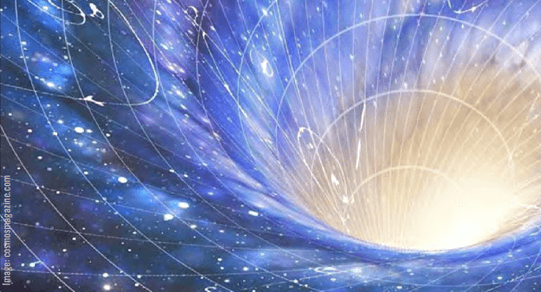 Physics offers reasons to think it
might be, starting with its status as
the fourth dimension. However, it also
throws up a lot of obstacles, some of
which may yet prove insurmountable. ...
We all know what is meant by time
travel: going to a point in either the past
or the future and (hopefully) returning
safely. Even if this is possible in theory,
there are some quite major practical
problems to consider.
To pick just one example: fictional
representations of time travel almost always
assume the traveler ends up in the
same location in space, relative to the
Earth, but would this be the case? After
all, even if you just traveled back in time
by a week, so you could bet on a sporting
contest for example, the Earth would
have moved millions of kilometers in its orbit around the Sun in that time, and
the Sun would, in turn, have migrated a
small way around the galaxy.
Unless some force maintains the
traveler’s position relative to the planet,
you’d find yourself floating helplessly in
space waiting for the Earth to catch up.
Ignoring this problem reflects a view of
the Earth as the center of the universe
disproven by Copernicus. If you assume
time travel involves conservation of
momentum, the traveler would likely
end up close to their location of origin,
but slight changes in direction could
still result in relative shifts in location
that could prove lethal. Nevertheless,
objections like this don’t make time
travel impossible, just impractical. ...
Read full text
Physics offers reasons to think it
might be, starting with its status as
the fourth dimension. However, it also
throws up a lot of obstacles, some of
which may yet prove insurmountable. ...
We all know what is meant by time
travel: going to a point in either the past
or the future and (hopefully) returning
safely. Even if this is possible in theory,
there are some quite major practical
problems to consider.
To pick just one example: fictional
representations of time travel almost always
assume the traveler ends up in the
same location in space, relative to the
Earth, but would this be the case? After
all, even if you just traveled back in time
by a week, so you could bet on a sporting
contest for example, the Earth would
have moved millions of kilometers in its orbit around the Sun in that time, and
the Sun would, in turn, have migrated a
small way around the galaxy.
Unless some force maintains the
traveler’s position relative to the planet,
you’d find yourself floating helplessly in
space waiting for the Earth to catch up.
Ignoring this problem reflects a view of
the Earth as the center of the universe
disproven by Copernicus. If you assume
time travel involves conservation of
momentum, the traveler would likely
end up close to their location of origin,
but slight changes in direction could
still result in relative shifts in location
that could prove lethal. Nevertheless,
objections like this don’t make time
travel impossible, just impractical. ...
Read full text
 Sportswear brand Puma has said it
is a step closer to launching a truly
biodegradable shoe, following a trial
in which a specially made version of
its Suede sneakers decomposed under
strict conditions.
In the Re:Suede experiment, 500
shoes were sent out to testers for six
months of wear. Of those shoes, 412
were returned to Puma and sent to an
industrial composting facility in The
Netherlands, where they were mixed
with other green waste and left to
biodegrade. After around three and a
half months, a large proportion of the
leather trainer had broken down sufficiently
to be sold as Grade A compost
—high-quality, typically used on
gardens and landscapes. Slowing things
down was the sole, which was made
of thermoplastic elastomer (TPE-E),
a type of rubber. It took longer than
the other components to break down
into small enough pieces to be classified
as compost, around six months.
...
Read full text:
Sportswear brand Puma has said it
is a step closer to launching a truly
biodegradable shoe, following a trial
in which a specially made version of
its Suede sneakers decomposed under
strict conditions.
In the Re:Suede experiment, 500
shoes were sent out to testers for six
months of wear. Of those shoes, 412
were returned to Puma and sent to an
industrial composting facility in The
Netherlands, where they were mixed
with other green waste and left to
biodegrade. After around three and a
half months, a large proportion of the
leather trainer had broken down sufficiently
to be sold as Grade A compost
—high-quality, typically used on
gardens and landscapes. Slowing things
down was the sole, which was made
of thermoplastic elastomer (TPE-E),
a type of rubber. It took longer than
the other components to break down
into small enough pieces to be classified
as compost, around six months.
...
Read full text:
 ‘Pose’ is an educational sex set for
the blind created by Polish designer
Karolina Kruszewska in collaboration
with sex educator Dr. Dagną Kocur.
Developed as part of Kruszewska’s
master’s thesis at the Academy of Fine
Arts in Katowice, the project offers extensive
knowledge about sex positions
and identifying anatomical features
to help guide the visually impaired in
intimate acts. This information is released
as 13 audio films on YouTube and
3D-printed figurines depicting the five
basic sex positions.
“Pose is a project dedicated primarily
to individual users, sex educators,
and organizations. The main goal of
the project was to make knowledge available to the blind, hence the
decision to record descriptions that
everyone could listen to on YouTube...”
writes the designer.
The second goal was to describe
the appearance of each 3D-printed
figure. For this purpose, Kruszewska
incorporated Braille reading, a tactile
feature considered the closest way for
blind people to ‘perceive’ the position
depicted by the models. To help users
optimize their ‘reading’ of each position,
Kruszewska had to magnify/rescale
certain anatomical parts. ...
Read full text:
Read full text
‘Pose’ is an educational sex set for
the blind created by Polish designer
Karolina Kruszewska in collaboration
with sex educator Dr. Dagną Kocur.
Developed as part of Kruszewska’s
master’s thesis at the Academy of Fine
Arts in Katowice, the project offers extensive
knowledge about sex positions
and identifying anatomical features
to help guide the visually impaired in
intimate acts. This information is released
as 13 audio films on YouTube and
3D-printed figurines depicting the five
basic sex positions.
“Pose is a project dedicated primarily
to individual users, sex educators,
and organizations. The main goal of
the project was to make knowledge available to the blind, hence the
decision to record descriptions that
everyone could listen to on YouTube...”
writes the designer.
The second goal was to describe
the appearance of each 3D-printed
figure. For this purpose, Kruszewska
incorporated Braille reading, a tactile
feature considered the closest way for
blind people to ‘perceive’ the position
depicted by the models. To help users
optimize their ‘reading’ of each position,
Kruszewska had to magnify/rescale
certain anatomical parts. ...
Read full text:
Read full text
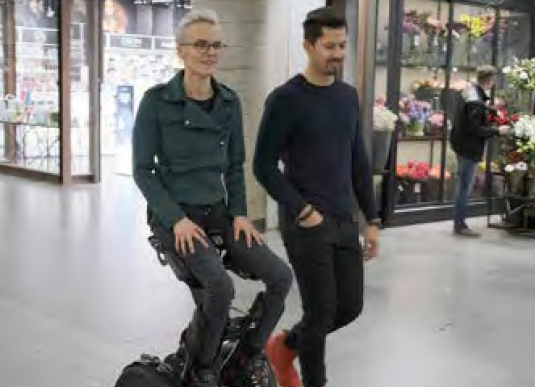 This self-balancing personal mobility
robot offers individuals with
mobility challenges a way to navigate
the world independently and comfortably
at eye level.
The Kim-e is hands-free and controlled
by intuitive upper body movements,
leaving the user open to taking
on other tasks. With a simple button
operation, users can lift themselves to
eye level and move around freely. The
device features an integrated air shock
absorber for a comfortable ride and a
folding backrest for easy transfers and
transportation.
Controlled via a smartphone, the
Kim-e is tailored to the user’s body
shape, with an ergonomic saddle,
backrest, and leg supports. It can reach
speeds of up to 12 mph and travel up to
19 miles on a four-hour charge of its
lithium battery. ...
Visit
Read full text
This self-balancing personal mobility
robot offers individuals with
mobility challenges a way to navigate
the world independently and comfortably
at eye level.
The Kim-e is hands-free and controlled
by intuitive upper body movements,
leaving the user open to taking
on other tasks. With a simple button
operation, users can lift themselves to
eye level and move around freely. The
device features an integrated air shock
absorber for a comfortable ride and a
folding backrest for easy transfers and
transportation.
Controlled via a smartphone, the
Kim-e is tailored to the user’s body
shape, with an ergonomic saddle,
backrest, and leg supports. It can reach
speeds of up to 12 mph and travel up to
19 miles on a four-hour charge of its
lithium battery. ...
Visit
Read full text
 When I [George Lundberg, MD] first
learned of restless legs syndrome
(RLS) was many decades ago. ... I read
about it and I realized that I may have it,
even though many months would pass
with no recurrence. ...
Between 1% and 15% of Americans are
believed to be affected by RLS. The cause
is unknown, but it seems to run in families.
It may be autosomal dominant, but
no causative genes have been confirmed.
... Many pharmacologic and physical
treatments have been tried with some
success for some patients, but over time,
these treatments have mostly failed. ...
Could the culprit be sugar? Early in
November 2023, I enjoyed a mini Dove
bar for dessert. I ate several not long before
bedtime. That night I had bad RLS.
Plus, I had repetitive leg cramps and that creepy-crawly skin sensation. ...
The way to determine whether a drug
is causing a reaction, condition, or disease
is to apply the challenge-dechallenge-
rechallenge testing method. Give
the drug, the patient demonstrates the
disease finding. Remove the drug, the
problem disappears. Repeat three times.
... Siwert de Groot, in the Netherlands,
published a very convincing use of this
technique in 2023: big-time sugar consumption
for a week, then low intake of
sugar for the following week, repeated
three times on one patient. ...
If you are serious about identifying or
treating RLS, I suggest that you incorporate
the International Restless Legs
Study Group Severity Rating Scale into
your practice ...
Read full text
When I [George Lundberg, MD] first
learned of restless legs syndrome
(RLS) was many decades ago. ... I read
about it and I realized that I may have it,
even though many months would pass
with no recurrence. ...
Between 1% and 15% of Americans are
believed to be affected by RLS. The cause
is unknown, but it seems to run in families.
It may be autosomal dominant, but
no causative genes have been confirmed.
... Many pharmacologic and physical
treatments have been tried with some
success for some patients, but over time,
these treatments have mostly failed. ...
Could the culprit be sugar? Early in
November 2023, I enjoyed a mini Dove
bar for dessert. I ate several not long before
bedtime. That night I had bad RLS.
Plus, I had repetitive leg cramps and that creepy-crawly skin sensation. ...
The way to determine whether a drug
is causing a reaction, condition, or disease
is to apply the challenge-dechallenge-
rechallenge testing method. Give
the drug, the patient demonstrates the
disease finding. Remove the drug, the
problem disappears. Repeat three times.
... Siwert de Groot, in the Netherlands,
published a very convincing use of this
technique in 2023: big-time sugar consumption
for a week, then low intake of
sugar for the following week, repeated
three times on one patient. ...
If you are serious about identifying or
treating RLS, I suggest that you incorporate
the International Restless Legs
Study Group Severity Rating Scale into
your practice ...
Read full text
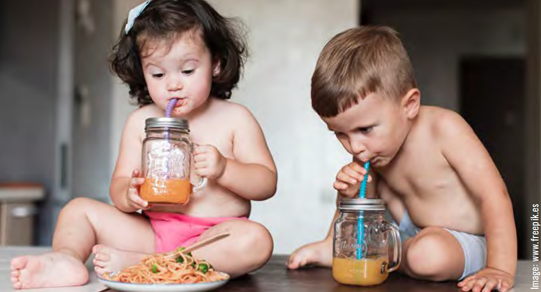 Fruit juice provides vitamins, minerals
and polyphenols in an easily
accessible form, and is part of the daily
diet of many people, providing one of
the recommended five a day (400g) of
fruit and vegetables.
However, many people are concerned
about the sugar content of fruit juice
—a 250 ml serving of orange juice
contains 22 grams, or 4.5 teaspoons of
sugar— but studies suggest that adverse
health effects, such as tooth decay
and some weight gain, are outweighed
by the health benefits.
To investigate whether fruit juice
causes weight gain, teams from Toronto
and Boston reviewed 42 studies
into the effect of drinking 100%
fruit juice —pure fruit juice with no
additives— daily. They found that in children, there
is a positive association between daily
drinking of fruit juice and weight gain.
In adults, no similar association was
seen except in studies that were not adjusted
for total energy intake. The study
is published in JAMA Paediatrics. ...
In all the studies analyzed, participants
consumed at least one 8oz serving
(or equivalent) of 100% juice each
day. The studies looked at a range of
fruit juices —pomegranate, berries, tart
cherry, apple, citrus, or grape juice—
and compared them with standard
diet alone, water, or diet or low calorie
drinks. ... The effects on weight ... were
greater in children than in adults. ...
Read full text:
Read full text:
Fruit juice provides vitamins, minerals
and polyphenols in an easily
accessible form, and is part of the daily
diet of many people, providing one of
the recommended five a day (400g) of
fruit and vegetables.
However, many people are concerned
about the sugar content of fruit juice
—a 250 ml serving of orange juice
contains 22 grams, or 4.5 teaspoons of
sugar— but studies suggest that adverse
health effects, such as tooth decay
and some weight gain, are outweighed
by the health benefits.
To investigate whether fruit juice
causes weight gain, teams from Toronto
and Boston reviewed 42 studies
into the effect of drinking 100%
fruit juice —pure fruit juice with no
additives— daily. They found that in children, there
is a positive association between daily
drinking of fruit juice and weight gain.
In adults, no similar association was
seen except in studies that were not adjusted
for total energy intake. The study
is published in JAMA Paediatrics. ...
In all the studies analyzed, participants
consumed at least one 8oz serving
(or equivalent) of 100% juice each
day. The studies looked at a range of
fruit juices —pomegranate, berries, tart
cherry, apple, citrus, or grape juice—
and compared them with standard
diet alone, water, or diet or low calorie
drinks. ... The effects on weight ... were
greater in children than in adults. ...
Read full text:
Read full text:
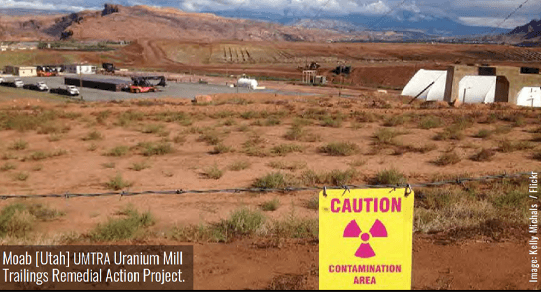 Three uranium mines have gone into
production along the Arizona-Utah
border, with more on the way elsewhere
in the Mountain West, as market conditions
for the mineral needed for nuclear
energy improve in response to a global
push to reduce the consumption of fossil
fuels to slow climate change.
But the mines, which were the first to
begin operations in the US in eight years
when they began extracting ore in late
December, are drawing fierce criticism
from tribes and environmentalists. One
of the mines in Arizona is located in
a new national monument President
Biden designated last year, while the
other two are located in Utah’s quarter
of the Four Corners region, where the
impacts of 20th-century uranium mining
persist to this day. ... For years, the permitted uranium
mines in Arizona and Utah sat dormant,
with the demand and price for uranium
too low to justify operating. But times
have changed, said Curtis Moore, a
spokesperson with Energy Fuels Resources,
the company behind the mines, as
uranium prices recently reached $90 per
pound. The price increased primarily for
two reasons. First is the agreement at
COP28 of more than 20 nations, including
the US, to triple nuclear energy production
to help achieve net-zero greenhouse
gas emissions globally by 2050.
The second is Russia’s war in Ukraine.
... Experts, however, are skeptical of the
role nuclear energy will play in the clean
energy transition. ...
Read full text:
Three uranium mines have gone into
production along the Arizona-Utah
border, with more on the way elsewhere
in the Mountain West, as market conditions
for the mineral needed for nuclear
energy improve in response to a global
push to reduce the consumption of fossil
fuels to slow climate change.
But the mines, which were the first to
begin operations in the US in eight years
when they began extracting ore in late
December, are drawing fierce criticism
from tribes and environmentalists. One
of the mines in Arizona is located in
a new national monument President
Biden designated last year, while the
other two are located in Utah’s quarter
of the Four Corners region, where the
impacts of 20th-century uranium mining
persist to this day. ... For years, the permitted uranium
mines in Arizona and Utah sat dormant,
with the demand and price for uranium
too low to justify operating. But times
have changed, said Curtis Moore, a
spokesperson with Energy Fuels Resources,
the company behind the mines, as
uranium prices recently reached $90 per
pound. The price increased primarily for
two reasons. First is the agreement at
COP28 of more than 20 nations, including
the US, to triple nuclear energy production
to help achieve net-zero greenhouse
gas emissions globally by 2050.
The second is Russia’s war in Ukraine.
... Experts, however, are skeptical of the
role nuclear energy will play in the clean
energy transition. ...
Read full text:
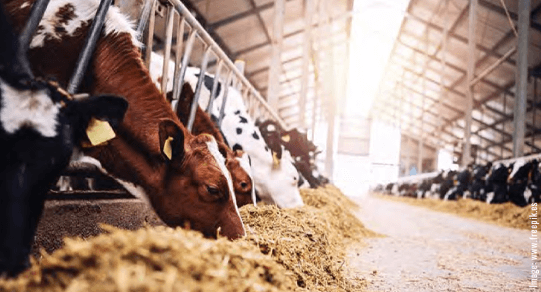 Dairy barns. Hog farms. Rotting trash.
All release methane, an especially
powerful planet-warming gas. Now,
scientists have found a new method to
quash that gas. The approach could slash
emissions from places like livestock barns
and landfills —and bring the planet one
step closer to slowing global warming. ...
People have dreamed of pulling methane
from the air to use as a resource,
says Matt Johnson. He’s a chemist at the
University of Copenhagen, in Denmark.
But that hasn’t worked, largely due to its
diffuse nature. “That’s one of the real
problems with methane,” he says. If it’s
not concentrated enough to burn, “it’s
hard to know how to use it.” Without a
way to capture this methane, scientists
have turned their attention to destroying
it. ... When sunlight hits naturally occurring
chlorine (Cl) in the air, it splits
the molecule. This creates two atoms,
each with an unpaired electron. They
are known as chlorine radicals (Cl·).
These radicals are very reactive. They
even react with stable methane molecules,
breaking them down. But since
there are relatively few chlorine radicals
around, this natural process tends to
eliminate only a small portion of the
methane in air.
Johnson and his team have now
designed a device to do the same thing.
To speed methane’s removal, they
boost the concentration of chlorine.
... In tests, the new device removed
58 percent of the methane from the
air. ...
Read full text:
Dairy barns. Hog farms. Rotting trash.
All release methane, an especially
powerful planet-warming gas. Now,
scientists have found a new method to
quash that gas. The approach could slash
emissions from places like livestock barns
and landfills —and bring the planet one
step closer to slowing global warming. ...
People have dreamed of pulling methane
from the air to use as a resource,
says Matt Johnson. He’s a chemist at the
University of Copenhagen, in Denmark.
But that hasn’t worked, largely due to its
diffuse nature. “That’s one of the real
problems with methane,” he says. If it’s
not concentrated enough to burn, “it’s
hard to know how to use it.” Without a
way to capture this methane, scientists
have turned their attention to destroying
it. ... When sunlight hits naturally occurring
chlorine (Cl) in the air, it splits
the molecule. This creates two atoms,
each with an unpaired electron. They
are known as chlorine radicals (Cl·).
These radicals are very reactive. They
even react with stable methane molecules,
breaking them down. But since
there are relatively few chlorine radicals
around, this natural process tends to
eliminate only a small portion of the
methane in air.
Johnson and his team have now
designed a device to do the same thing.
To speed methane’s removal, they
boost the concentration of chlorine.
... In tests, the new device removed
58 percent of the methane from the
air. ...
Read full text:
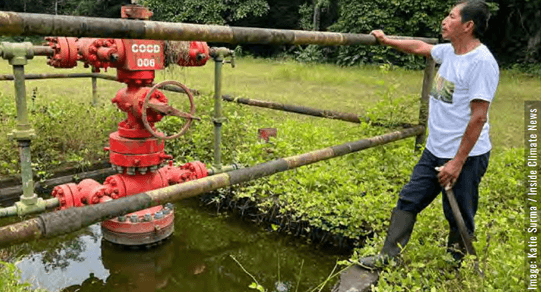 When Rafael Correa entered Ecuador’s
presidency in 2007, Ecuador’s
economy depended on oil, and
global crude prices were near a record
high. Much of the oil was extracted by
foreign companies, so as prices surged
more wealth began flowing overseas.
More than a third of Ecuadorians were
living in poverty ... Correa increased
a recently enacted windfall tax on oil
companies. The idea was to use the tax
as leverage to extract better terms from
the companies, and this fight against
foreign firms quickly became a highprofile
pillar of Correa’s broader campaign
to assert the nation’s sovereignty.
The oil companies fought back,
however, and they turned to an obscure
corner of international law that extended
beyond Correa’s reach. Within
months, two oil companies working as partners ceased paying the tax and sued
the government through a system of
international tribunals known as investor
state dispute settlements, or ISDS.
The system allows foreign investors to
sue governments before tribunals outside
the jurisdiction of national courts,
if they can make a case that their contracts
or existing trade or investment
treaties have been breached. ...
Critics say the ISDS system gives corporations
an exclusive, parallel justice
system that elevates foreign interests
above human rights and environmental
concerns. Because the system is shrouded
in secrecy, it is impossible to know
how many claims have been filed or the
total amount awarded by tribunals. ...
Read full text:
When Rafael Correa entered Ecuador’s
presidency in 2007, Ecuador’s
economy depended on oil, and
global crude prices were near a record
high. Much of the oil was extracted by
foreign companies, so as prices surged
more wealth began flowing overseas.
More than a third of Ecuadorians were
living in poverty ... Correa increased
a recently enacted windfall tax on oil
companies. The idea was to use the tax
as leverage to extract better terms from
the companies, and this fight against
foreign firms quickly became a highprofile
pillar of Correa’s broader campaign
to assert the nation’s sovereignty.
The oil companies fought back,
however, and they turned to an obscure
corner of international law that extended
beyond Correa’s reach. Within
months, two oil companies working as partners ceased paying the tax and sued
the government through a system of
international tribunals known as investor
state dispute settlements, or ISDS.
The system allows foreign investors to
sue governments before tribunals outside
the jurisdiction of national courts,
if they can make a case that their contracts
or existing trade or investment
treaties have been breached. ...
Critics say the ISDS system gives corporations
an exclusive, parallel justice
system that elevates foreign interests
above human rights and environmental
concerns. Because the system is shrouded
in secrecy, it is impossible to know
how many claims have been filed or the
total amount awarded by tribunals. ...
Read full text:
 More than 450,000 children are
living in residential care homes
across Europe and Central Asia,
highlighting that a “painful legacy”
of neglect, abuse, exploitation and
psychological trauma is far from over,
according to a UNICEF report released in
January. The UN Children’s Fund’s investigation,
Pathways to Better Protection,
reveals that children with disabilities
account for up to 87 per cent of those
in care, where data is available. In addition,
the numbers of unaccompanied
children seeking asylum in such institutions
in western Europe is on the rise.
“We have a long way to go before
ending Europe and Central Asia’s long
and painful legacy of institutionalizing
children,” said Regina De Dominicis,
UNICEF director for the region. Children
in institutions often struggle to form positive relationships throughout childhood
and adulthood, leaving them feeling
isolated and lonely. Moreover, those
in residential care, particularly from
a young age, may experience cognitive,
linguistic and other developmental
delays, making them more susceptible
to falling foul of the legal system and
being institutionalized again. ...
To conform with the Convention
on the Rights of the Child (CRC),
and the UN Guidelines on Alternative
Care, UNICEF emphasized the need for
the systematic closure of large-scale
institutions used to house and educate
children. This includes replacing
residential facilities for children with
disabilities or unaccompanied and
separated children with high-quality
family and community-based care. ...
More than 450,000 children are
living in residential care homes
across Europe and Central Asia,
highlighting that a “painful legacy”
of neglect, abuse, exploitation and
psychological trauma is far from over,
according to a UNICEF report released in
January. The UN Children’s Fund’s investigation,
Pathways to Better Protection,
reveals that children with disabilities
account for up to 87 per cent of those
in care, where data is available. In addition,
the numbers of unaccompanied
children seeking asylum in such institutions
in western Europe is on the rise.
“We have a long way to go before
ending Europe and Central Asia’s long
and painful legacy of institutionalizing
children,” said Regina De Dominicis,
UNICEF director for the region. Children
in institutions often struggle to form positive relationships throughout childhood
and adulthood, leaving them feeling
isolated and lonely. Moreover, those
in residential care, particularly from
a young age, may experience cognitive,
linguistic and other developmental
delays, making them more susceptible
to falling foul of the legal system and
being institutionalized again. ...
To conform with the Convention
on the Rights of the Child (CRC),
and the UN Guidelines on Alternative
Care, UNICEF emphasized the need for
the systematic closure of large-scale
institutions used to house and educate
children. This includes replacing
residential facilities for children with
disabilities or unaccompanied and
separated children with high-quality
family and community-based care. ...
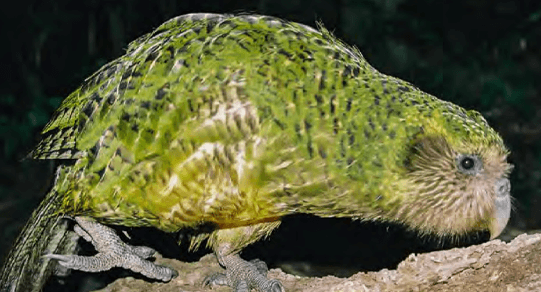 Kākāpō used to be widespread on
mainland New Zealand but through
the introduction of predators, hunting
and land clearance, their numbers drastically
dropped and the species seemed
doomed to extinction. That was until the
exhaustive conservation efforts by the
Department of Conservation in the 1980s,
followed by the formation of the Kākāpō
Recovery Programme in 1996. KRP hatched
a bold new plan to create predator-free
islands, with increased funding, staffing,
and an advisory group.
Kākāpō currently breed on two main
predator-free islands —
Whenua Hou
(Codfish Island) west of Rakiura (Stewart
Island) and Pukenui (Anchor Island) in
Dusky Sound, Fiordland. In a conservation
milestone, ten kākāpō were released
at Sanctuary Mountain Maungatautari in 2023. This also marked a new phase for
the programme and is an important step
towards the long-term goal of returning
kākāpō across Aotearoa.
When the Kākāpō Recovery Programme
was established, there were
only 51 known birds. After bumper
breeding seasons in 2019 and 2022, the
population reached a high of 252 and as
at October 2023, sits at 247.
“Kākāpō are treasured by Ngāi Tahu
as a taonga species, they are part of our
tribal identity and it’s wonderful to see
that Meridian values them too,” says
Tāne Davis, the Ngāi Tahu appointee to
the Kākāpō Recovery Group. ...
Kākāpō used to be widespread on
mainland New Zealand but through
the introduction of predators, hunting
and land clearance, their numbers drastically
dropped and the species seemed
doomed to extinction. That was until the
exhaustive conservation efforts by the
Department of Conservation in the 1980s,
followed by the formation of the Kākāpō
Recovery Programme in 1996. KRP hatched
a bold new plan to create predator-free
islands, with increased funding, staffing,
and an advisory group.
Kākāpō currently breed on two main
predator-free islands —
Whenua Hou
(Codfish Island) west of Rakiura (Stewart
Island) and Pukenui (Anchor Island) in
Dusky Sound, Fiordland. In a conservation
milestone, ten kākāpō were released
at Sanctuary Mountain Maungatautari in 2023. This also marked a new phase for
the programme and is an important step
towards the long-term goal of returning
kākāpō across Aotearoa.
When the Kākāpō Recovery Programme
was established, there were
only 51 known birds. After bumper
breeding seasons in 2019 and 2022, the
population reached a high of 252 and as
at October 2023, sits at 247.
“Kākāpō are treasured by Ngāi Tahu
as a taonga species, they are part of our
tribal identity and it’s wonderful to see
that Meridian values them too,” says
Tāne Davis, the Ngāi Tahu appointee to
the Kākāpō Recovery Group. ...
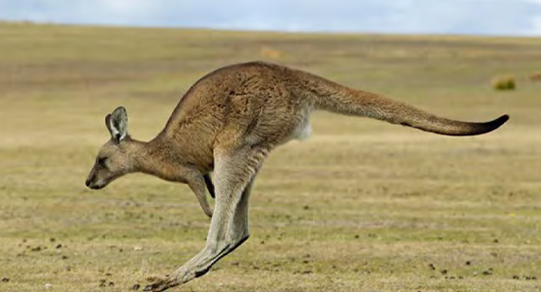 Eurogroup for Animals and 6 animal
welfare and conservation organisations
sent a letter to the CEO of Adidas,
asking the company to stop the production
of shoes using kangaroo leather.
This initiative follows the encouraging
announcements by Nike and Puma to
end the use of “k-leather” in their lines.
In Australia 1.6 million kangaroos are
killed each year, raising serious animal
welfare concerns. In addition, kangaroo
populations are already suffering from
the consequences of climate change
such as droughts, floods and bushfires
while the methods to estimate populations
are questionable.
Kangaroo derived products, including
leather, are exported to various
regions including the European Union.
The EU represents an important market
for athletic shoes, and several brands continue to produce football shoes
made of kangaroo leather, also called
k-leather. Athletic shoes made from
synthetic materials have proven high
performance, making the use of kangaroo
leather totally dispensable.
In March, Puma and Nike announced
they will end the production of athletic
shoes using kangaroo leather. We welcome
this crucial shift for the protection
and conservation of this iconic
Australian species. However, Adidas
continues to produce and sell k-leather
shoes, despite the serious concerns
raised by animal welfare organisations
over cruel methods used to kill
kangaroos, and despite EU consumers’
demands for cruelty-free products. ...
Eurogroup for Animals and 6 animal
welfare and conservation organisations
sent a letter to the CEO of Adidas,
asking the company to stop the production
of shoes using kangaroo leather.
This initiative follows the encouraging
announcements by Nike and Puma to
end the use of “k-leather” in their lines.
In Australia 1.6 million kangaroos are
killed each year, raising serious animal
welfare concerns. In addition, kangaroo
populations are already suffering from
the consequences of climate change
such as droughts, floods and bushfires
while the methods to estimate populations
are questionable.
Kangaroo derived products, including
leather, are exported to various
regions including the European Union.
The EU represents an important market
for athletic shoes, and several brands continue to produce football shoes
made of kangaroo leather, also called
k-leather. Athletic shoes made from
synthetic materials have proven high
performance, making the use of kangaroo
leather totally dispensable.
In March, Puma and Nike announced
they will end the production of athletic
shoes using kangaroo leather. We welcome
this crucial shift for the protection
and conservation of this iconic
Australian species. However, Adidas
continues to produce and sell k-leather
shoes, despite the serious concerns
raised by animal welfare organisations
over cruel methods used to kill
kangaroos, and despite EU consumers’
demands for cruelty-free products. ...
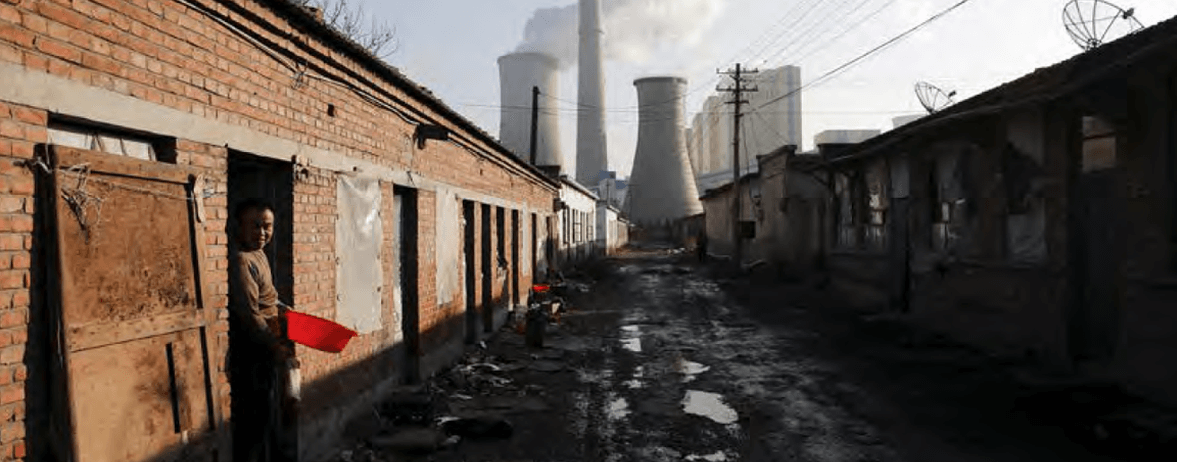
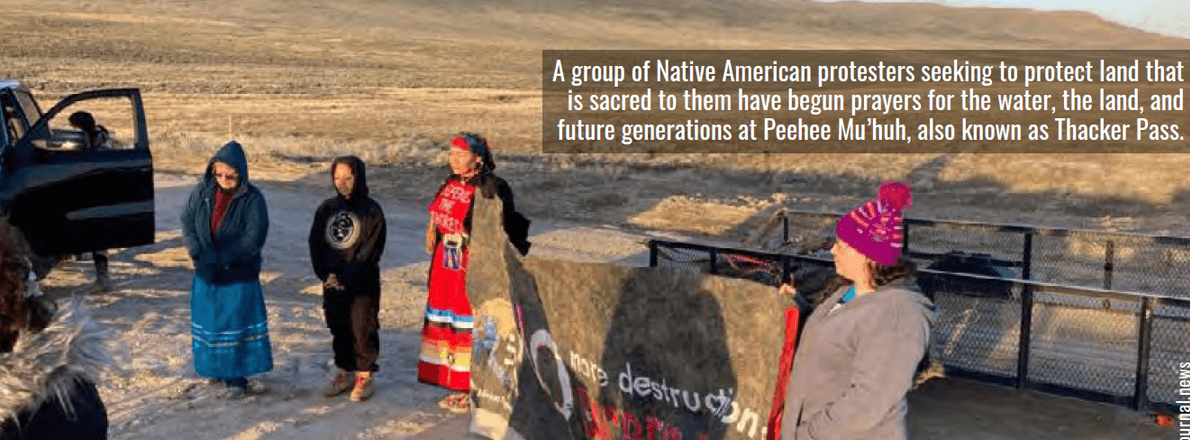 As Stan Cox has written:
Globally, mining and processing
of metallic ores has doubled just
since 2000 and is responsible for
a whopping 10 percent of total world energy consumption. Now,
if plans to “electrify everything”
are carried out worldwide, the
tonnage of metal extracted
and processed in the next 15
years alone will exceed the
tonnage that humans have
produced during the 5,000
years since the start of the
Bronze Age.
The Washington Post, citing
International Energy Agency figures,
predicts that by 2040, global
demand for metals that go into
batteries will balloon 20-fold for
nickel and cobalt and 40-fold for
lithium; demand for manganese,
critical for wind turbines, will
increase ninefold in just the next
decade. Demand for aluminum,
which is already produced in
vastly larger quantities than any
of those metals, will increase by
yet another 40 percent, largely to
produce lighter-weight electric
cars and support solar arrays.
Forbes estimates that almost
400 new mines will be opened
worldwide by 2035 just to keep
battery factories supplied with cobalt,
lithium, and nickel. This will
create many more of what have
come to be known as “green
sacrifice zones”: localities
across the world, from Congo to
Guinea to China to Bolivia to the
Pacific Ocean, that are bearing or
will bear the human, environmental,
and socioeconomic costs
of the transition to non-fossil energy.
And the deployment of wind
and solar power plants across
the world’s windier and sunnier
regions will mean converting vast
stretches of the Earth’s land surface
and even seabeds into industrial
energy farms.
As Stan Cox has written:
Globally, mining and processing
of metallic ores has doubled just
since 2000 and is responsible for
a whopping 10 percent of total world energy consumption. Now,
if plans to “electrify everything”
are carried out worldwide, the
tonnage of metal extracted
and processed in the next 15
years alone will exceed the
tonnage that humans have
produced during the 5,000
years since the start of the
Bronze Age.
The Washington Post, citing
International Energy Agency figures,
predicts that by 2040, global
demand for metals that go into
batteries will balloon 20-fold for
nickel and cobalt and 40-fold for
lithium; demand for manganese,
critical for wind turbines, will
increase ninefold in just the next
decade. Demand for aluminum,
which is already produced in
vastly larger quantities than any
of those metals, will increase by
yet another 40 percent, largely to
produce lighter-weight electric
cars and support solar arrays.
Forbes estimates that almost
400 new mines will be opened
worldwide by 2035 just to keep
battery factories supplied with cobalt,
lithium, and nickel. This will
create many more of what have
come to be known as “green
sacrifice zones”: localities
across the world, from Congo to
Guinea to China to Bolivia to the
Pacific Ocean, that are bearing or
will bear the human, environmental,
and socioeconomic costs
of the transition to non-fossil energy.
And the deployment of wind
and solar power plants across
the world’s windier and sunnier
regions will mean converting vast
stretches of the Earth’s land surface
and even seabeds into industrial
energy farms. Combines an
elegant mini
baby grand piano
design with exquisite
polished
ebony cabinet
and a modern leg
design. 88-Note,
fully-weighted
graded-hammer
action with a
3-point velocity
sensor and
adjustable touch
sensitive keys.
kurzweil.com
Combines an
elegant mini
baby grand piano
design with exquisite
polished
ebony cabinet
and a modern leg
design. 88-Note,
fully-weighted
graded-hammer
action with a
3-point velocity
sensor and
adjustable touch
sensitive keys.
kurzweil.com
 The cutest gift with the most adorable
snacks and specialty items from Japan.
Limited Edition. Supports Japanese
family businesses.
www.bokksu.com
The cutest gift with the most adorable
snacks and specialty items from Japan.
Limited Edition. Supports Japanese
family businesses.
www.bokksu.com


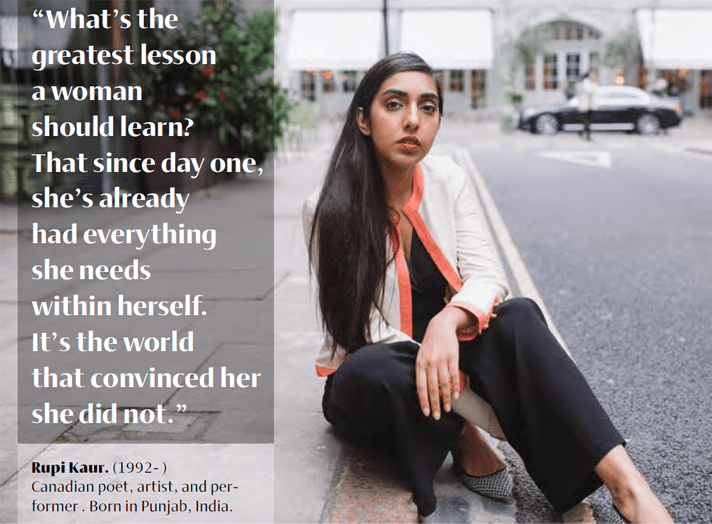
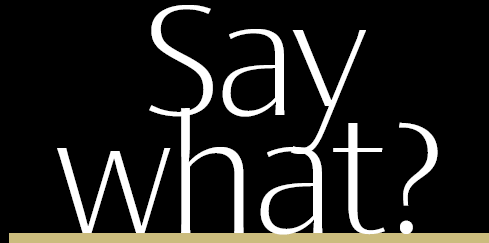
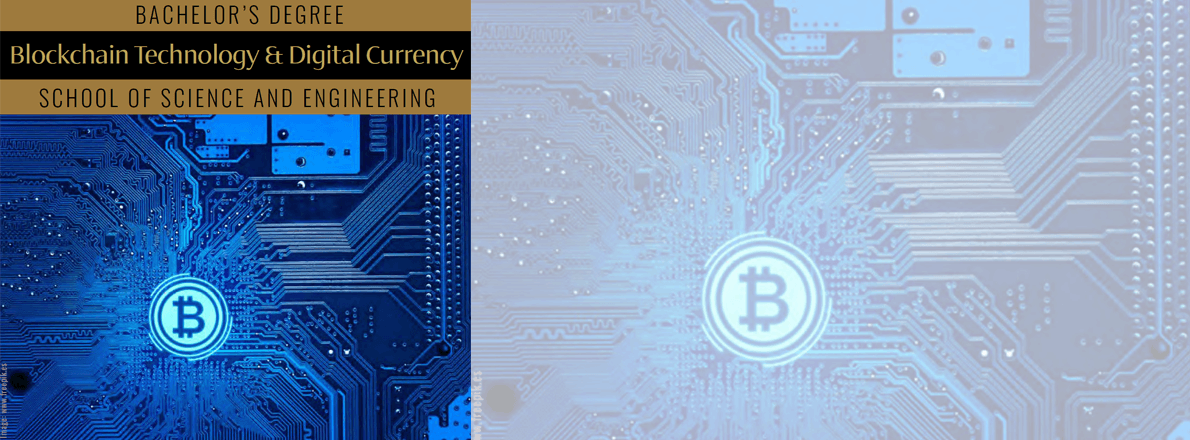 The Bachelor in Blockchain Technology
and Digital Currency program
prepares students to understand
cryptocurrencies as well as the benefits
of blockchain technology. Students are
introduced to blockchain technology
and how to apply this concept to other
fields like healthcare, contracts, supply
chains, voting, telecoms, pharmaceuticals,
energy and of course banking and
finance. Other concepts related to digital
currencies also includes the future
of digital currencies as a decentralized
currency, international and financial
currency markets. This new field is
gaining momentum and any business
leader or innovator would benefit from
understanding these new concepts as
they will slowly continue to evolve
until they are part of every day society.
The Bachelor in Blockchain Technology
and Digital Currency at AIU, is
a distance learning program that will
be tailor-made and designed exclusively
for you, by you, and with your
counselor. The flexibility to meet your
needs is rarely found in any other distance
learning program. Our program
does not require that each student
studies the same subjects and uses
the same books and study materials as
other students. Instead, our online Associate
Programs are designed just for
you. They are individually designed to
meet your needs and help you achieve
your professional and personal goals..
The Bachelor in Blockchain Technology
and Digital Currency program
prepares students to understand
cryptocurrencies as well as the benefits
of blockchain technology. Students are
introduced to blockchain technology
and how to apply this concept to other
fields like healthcare, contracts, supply
chains, voting, telecoms, pharmaceuticals,
energy and of course banking and
finance. Other concepts related to digital
currencies also includes the future
of digital currencies as a decentralized
currency, international and financial
currency markets. This new field is
gaining momentum and any business
leader or innovator would benefit from
understanding these new concepts as
they will slowly continue to evolve
until they are part of every day society.
The Bachelor in Blockchain Technology
and Digital Currency at AIU, is
a distance learning program that will
be tailor-made and designed exclusively
for you, by you, and with your
counselor. The flexibility to meet your
needs is rarely found in any other distance
learning program. Our program
does not require that each student
studies the same subjects and uses
the same books and study materials as
other students. Instead, our online Associate
Programs are designed just for
you. They are individually designed to
meet your needs and help you achieve
your professional and personal goals..
 Atlantic International University is accredited by the Accreditation Service for International
Schools, Colleges and Universities (ASIC). ASIC Accreditation is an internationally
renowned quality standard for colleges and universities. Visit ASIC’s Directory of Accredited
Colleges and Universities. ASIC is a member of CHEA International Quality Group
(CIQG) in the USA, an approved accreditation body by the Ministerial Department of the Home Office
in the UK, and is listed in the International Directory of the Council for Higher Education Accreditation
(CHEA). The University is based in the United States and was established by corporate charter in 1998.
Atlantic International University is accredited by the Accreditation Service for International
Schools, Colleges and Universities (ASIC). ASIC Accreditation is an internationally
renowned quality standard for colleges and universities. Visit ASIC’s Directory of Accredited
Colleges and Universities. ASIC is a member of CHEA International Quality Group
(CIQG) in the USA, an approved accreditation body by the Ministerial Department of the Home Office
in the UK, and is listed in the International Directory of the Council for Higher Education Accreditation
(CHEA). The University is based in the United States and was established by corporate charter in 1998.
 In some cases, accredited colleges
may not accept for transfer courses and degrees
completed at unaccredited colleges, and some
employers may require an accredited degree as
a basis for eligibility for employment. Potential
students should consider how the above may affect
their interests, AIU respects the unique rules and
regulations of each country and does not seek to
influence the respective authorities. In the event
that a prospective student wishes to carry out any
government review or process in regards to his
university degree, we recommend that the requirements
of such are explored in detail with the relevant
authorities by the prospective student as the
university does not intervene in such processes.
AIU students can be found in over 180 countries,
they actively participate and volunteer
in their communities as part of their academic
program and have allocated thousands of service
hours to diverse causes and initiatives. AIU
programs follow the standards commonly used by
colleges and universities in the United States with
regards to the following: academic program
structure, degree issued, transcript, and
other graduation documents.
AIU graduation documents can include
an apostille and authentication from the
US Department of State to facilitate their
use internationally.
In some cases, accredited colleges
may not accept for transfer courses and degrees
completed at unaccredited colleges, and some
employers may require an accredited degree as
a basis for eligibility for employment. Potential
students should consider how the above may affect
their interests, AIU respects the unique rules and
regulations of each country and does not seek to
influence the respective authorities. In the event
that a prospective student wishes to carry out any
government review or process in regards to his
university degree, we recommend that the requirements
of such are explored in detail with the relevant
authorities by the prospective student as the
university does not intervene in such processes.
AIU students can be found in over 180 countries,
they actively participate and volunteer
in their communities as part of their academic
program and have allocated thousands of service
hours to diverse causes and initiatives. AIU
programs follow the standards commonly used by
colleges and universities in the United States with
regards to the following: academic program
structure, degree issued, transcript, and
other graduation documents.
AIU graduation documents can include
an apostille and authentication from the
US Department of State to facilitate their
use internationally.
| Dr. Franklin Valcin Presi den t/Academic Dean |
Dr. José Mercado Chief Executive Officer Chairman of the Board of Trustees |
Ricardo González, PhD Provost |
| Dr. Ricardo Gonzalez Chief Operation Officer and MKT Director |
Linda Collazo Logistics Coordinator |
AIU Tutors Coordinators: Deborah Rodriguez Amiakhor Ejaeta Amanda Gutierrez William Mora Miriam James Admissions Coordinators: Amalia Aldrett Sandra Garcia Junko Shimizu Veronica Amuz Alba Ochoa Jenis Garcia Judith Brown Chris Soto René Cordón Dr. Anderas Rissler Academic Coordinators: Dr. Adesida Oluwafemi Dr. Emmanuel Gbagu Dr. Lucia Gorea Dr. Edgar Colon Dr. Mario Rios Freddy Frejus Dr. Nilani Ljunggren De Silva Dr. Scott Wilson Dr. Mohammad Shaidul Islam |
| Dr. Miriam Garibaldi Vice provost for Research |
Carolina Valdes Human Resource Coordinator |
|
| Dr. Ofelia Miller Director of AIU |
Carlos Aponte Teleco mmunications Coordinator |
|
| Clara Margalef Director of Special Projects of AIU |
David Jung Corporate/Legal Counsel |
|
| Juan Pablo Moreno Director of Operations |
Bruce Kim Advisor/Consultant |
|
| Paula Viera Director of Intelligence Systems |
Thomas Kim Corporate/ Accounting Counsel |
|
| Felipe Gomez Design Director / IT Supervisor |
Maricela Esparza Administrative Coordinator |
|
| Kevin Moll Web Designer |
Chris Benjamin IT and Hosting Support |
|
| Daritza Ysla IT Coordinator |
Maria Pastrana Accounting Coordinator |
|
| Daritza Ysla IT Coordinator |
Roberto Aldrett Communications Coordinator |
|
| Nadeem Awan Chief Programming Officer |
Giovanni Castillo IT Support |
|
| Dr. Edward Lambert Academic Director |
Antonella Fonseca Quality Control & Data Analysis |
|
| Dr. Ariadna Romero Advisor Coordinator |
Adrián Varela Graphic Design |
|
| Jhanzaib Awan Senior Programmer |
Vanesa D’Angelo Content Writer |
|
| Leonardo Salas Human Resource Manager |
Jaime Rotlewicz Dean of Admissions |
|
| Benjamin Joseph IT and Technology Support |
Michael Phillips Registrar’s Office |
|
| Rosie Perez Finance Coordinator |
||
 The School of Business and Economics
allows aspiring and practicing
professionals, managers, and entrepreneurs
in the private and public sectors
to complete a self paced distance
learning degree program of the highest
academic standard.
The ultimate goal is to empower
learners and help them take advantage
of the enormous array of resources
from the world environment in order
to eliminate the current continuum of
poverty and limitations.
Degree programs are designed for
those students whose professional experience has been in business,
marketing, administration, economics,
finance and management.
The School of Business and Economics
allows aspiring and practicing
professionals, managers, and entrepreneurs
in the private and public sectors
to complete a self paced distance
learning degree program of the highest
academic standard.
The ultimate goal is to empower
learners and help them take advantage
of the enormous array of resources
from the world environment in order
to eliminate the current continuum of
poverty and limitations.
Degree programs are designed for
those students whose professional experience has been in business,
marketing, administration, economics,
finance and management.
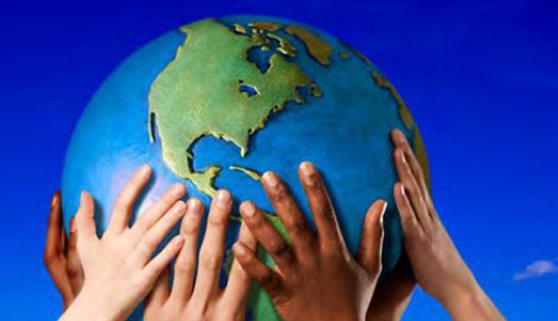 The School of Social and Human Studies
is focused on to the development of
studies which instill a core commitment
to building a society based on social and
economic justice and enhancing opportunities
for human well being.
The founding principles lie on the
basic right of education as outlined
in the Declaration of Human Rights.
We instill in our students a sense of
confidence and self reliance in their
ability to access the vast opportunities
available through information channels,
the world wide web, private, public,
nonprofit, and nongovernmental organizations in an ever expanding
global community.
Degree programs are aimed towards
those whose professional life has been
related to social and human behavior,
with the arts, or with cultural studies.
The School of Social and Human Studies
is focused on to the development of
studies which instill a core commitment
to building a society based on social and
economic justice and enhancing opportunities
for human well being.
The founding principles lie on the
basic right of education as outlined
in the Declaration of Human Rights.
We instill in our students a sense of
confidence and self reliance in their
ability to access the vast opportunities
available through information channels,
the world wide web, private, public,
nonprofit, and nongovernmental organizations in an ever expanding
global community.
Degree programs are aimed towards
those whose professional life has been
related to social and human behavior,
with the arts, or with cultural studies.
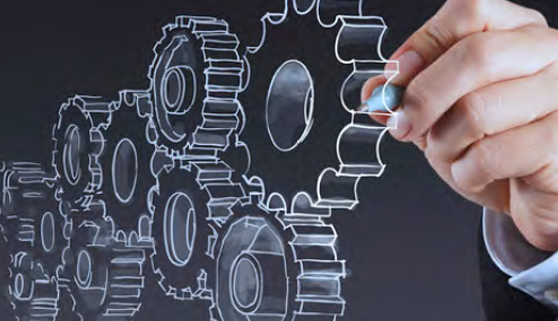 The School of Science and Engineering
seeks to provide dynamic, integrated,
and challenging degree programs
designed for those whose experience
is in industrial research, scientific production,
engineering and the general
sciences. Our system for research and
education will keep us apace with the
twenty-first century reach scientific
advance in an environmentally and
ecologically responsible manner to allow
for the sustainability of the human
population. We will foster among our
students a demand for ethical behavior,
an appreciation for diversity, an understanding
of scientific investigation, knowledge of design innovation, a
critical appreciation for the importance
of technology and technological change
for the advancement of humanity.
The School of Science and Engineering
seeks to provide dynamic, integrated,
and challenging degree programs
designed for those whose experience
is in industrial research, scientific production,
engineering and the general
sciences. Our system for research and
education will keep us apace with the
twenty-first century reach scientific
advance in an environmentally and
ecologically responsible manner to allow
for the sustainability of the human
population. We will foster among our
students a demand for ethical behavior,
an appreciation for diversity, an understanding
of scientific investigation, knowledge of design innovation, a
critical appreciation for the importance
of technology and technological change
for the advancement of humanity.
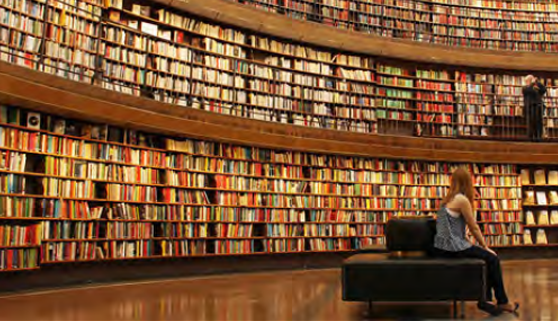 With access to a global catalog created and maintained collectively by more than
9,000 participating institutions, AIU students have secured excellent research
tools for their study programs.
With access to a global catalog created and maintained collectively by more than
9,000 participating institutions, AIU students have secured excellent research
tools for their study programs.